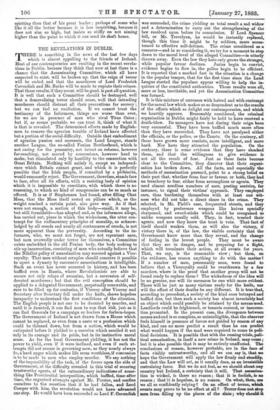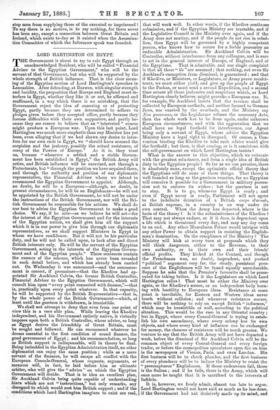THE REVELATIONS EST DUBLIN. T HERE is something in the news
of the last few days which is almost appalling to the friends of Ireland. Most of our contemporaries are exulting in the recent revela- tions in Dublin, because they think that now at last there is a chance that the Assassinating Committee, which all have suspected to exist, will be broken up, that the reign of terror will be ended, and that the murderers of Lord Frederick Cavendish and Mr. Burke will be made to expiate their crimes. That those results, if they occur, will be good, is past all question. It is well that such a Committee should be destroyed, well that a demoralising terror should cease, well that intending murderers should distrust all their precautions for secrecy ; but we can feel no exultation. If we cannot trust the testimony of the Informers, things are worse than ever, for we are in presence of men who rival Titus Oates ; but if, as seems probable, we can trust it, think of what it is that is revealed. The determined efforts made by English- men to remove the agrarian trouble of Ireland have affected but a portion of the social difficulty. Outside that embodiment of agrarian passion and unreason, the Land League, stands another League, the so-called Fenian Brotherhood, which is not caring for the peasantry, not intent on reforms, however far-reaching, not moved by concessions, however hard to make, but stimulated only by hostility to the connection with Great Britain. Nothing will satisfy it, except an independ- ence which Britain cannot grant, and which it is perfectly possible that the Irish people, if consulted by a plebiscite, would summarily reject. The Government, therefore, stands face to face, after all its efforts, with a resisting body of opinion which it is impossible to conciliate, with which there is no reasoning, to which no kind of compromise can be so much as offered. It is as if Stephenson had found, after filling Chat Moss, that the Moss itself rested on pillars which, as the weight reached a certain point, also gave way. As if that were not enough, a section of this body—small, it may be, but still formidable—has adopted and, as the informers allege, has carried out, plans in which the wickedness, the utter con- tempt for the rudimentary principles of morality, as acknow- ledged by all creeds and nearly all contemners of creeds, is not more apparent than the perversity. According to the in- formers, who, we must not forget, are not repentant men, but men avowedly under terror for themselves, a Committee exists embedded in the old Fenian body, the body seeking to stir up insurrection, consisting of men who actually believe that the Nihilist policy of assassination may succeed against a Vice- royalty. That men without scruples should conceive it possible to upset a dynasty by successive assassinations is intelligible. Such an event has never occurred in history, and has been baffled even in Russia, where Revolutionists are • able to secure not only relays of assassins, but a succession of self- devoted murderers ; but that the evil conception should be applied to a delegated Government, perpetually-renewable, and sure to be filled up for centuries, -if Viceroy after Viceroy and Secretary after Secretary fell under the knife, shows hopeless incapacity to understand the first conditions of the situation. The English people is not one to be daunted by murder, and until it is daunted, it can find men to run that risk, just as it can find Generals for a campaign or leaders for forlorn-hopes. The Government of Ireland is not drawn from a House which cannot be replaced, or even from a caste or a profession which could be thinned down, but from a nation, which would be extirpated before it yielded to a coercion which assailed it not only in its courage and its pride, but in its instinctive moral sense. As for the local Government yielding, it has not the power to yield, even if it were inclined, and even if such at- tempts did not arouse in governing men, as they nearly always do, a hard anger which makes life seem worthless, if concession is to be made to men who employ murder. We say nothing of the impossibility of the task, of the forces upon the side of Government, of the difficulty revealed in this trial of securing trustworthy agents, of the extraordinary indications of some- thing like Providential interposition, which baffled, time after time, the organised attempts against Mr. Forster, and confine ourselves to the assertion that if he had fallen, and Lord Cowper with him, the revolution would not have advanced one step. He wonld have been succeeded as Lord F. Cavendish was succeeded, the crime yielding as total result a sad widow and a determination to carry out the strengthening of the law resolved upon before its commission. If Lord Spencer fell, or Mr. Trevelyan, he would be instantly replaced, though this time it might be by soldiers, more accus- tomed to effective self-defence. The crime considered as a resource—and in so considering it, we try for a moment to step dawn to the moral level of the alleged Committee—is utterly thrown away. Even the law they hate only grows the stronger, while popular favour declines. Juries begin to convict, evidence begins to flow in, the police begin to be efficient. It is reported that a marked fact in the situation is a change in the popular temper, that for the first time since the Land League started the populace appear willing to help the in- quiries of the constituted authorities. Those results were all, more or less, inevitable, and yet the Assassination Committee was formed.
It is this mixture of unreason with hatred and with contempt for the moral law which makes us so despondent as to the results of the efforts which so delight our contemporaries, and which we heartily approve. Reasonably considered, the criminal organisation in Dublin might fairly be held to have received a death-blow. Its managers have not during their reign been very successful. They have been baffled much more often than they have succeeded. They have not paralysed either the officials, or the police, or the Courts. On the contrary, all these have grown more resolute, more intelligent, and more hard. Nor have they attracted the population. On the contrary, there is some evidence that they have shocked them, and that the willingness to give evidence is not all the result of fear. Just as these facts become clear to the Committee, they discover that their organi- sation has broken down. All the facts, and especially the methods of assassination pursued, point to a strong belief on their part that, whether from fear or favour, or both, they had no treachery to fear, either from accomplices or agents. They used almost needless numbers of men, posting sentries, for instance, to signal their victims' approach. They employed cars, thus burdening themselves with at least one wit- ness who did not take a direct share in the crime. They selected, in Mr. Field's case, frequented streets, and they employed by preference weapons like knives specially sharpened, and sword-sticks which could be recognised, as unlike weapons usually sold. They, in fact, trusted their agents, and now they know the trust is vain. That fact of itself should weaken them, as will also the victory, if victory there is, of the law, the visible certainty that the Government know more than they reveal, and the change of feeling in the lowest people. They must be aware that they are in danger, and be preparing for a flight, which will terminate their action, at all events for years. That, we say, is the reasonable view ; but then, on the evidence, has reason anything to do with the matter? If a number of men, presumably sane, were found to believe that a Viceroyalty could be overthrown by a few murders, where is the proof that another group will not be found ready to replace them? The wickedness of the idea will be no greater, nor will its unreason be one whit more evident. There will be just as many victims ready for the knife, nor will the effect of their deaths be any different. It is true that, according to precedent, a society of the kind once betrayed and baffled dies, but then such a society has almost invariably had an object which could possibly be attained by the mean/varied. Landlords could be frightened, or tenants coerced, or insurrec- tion promoted. In the present case, the divergence between means and end is so complete, so unintelligible, that the observer feels himself in presence of forces not guided by reason of any kind, and can no more predict a result than he can predict what would happen if the mad were required to come to poli- tical decisions. It is possible that with the coming trials, poli- tical assassination, in itself a new crime in Ireland, may cease ; but it is also possible that it may be entirely unaffected. The conclusions of reason, however probable, are in the face of facto visibly untrustworthy, and all we can say is, that we hope the Government will apply the law firmly and- steadily, and that the Law will act, as it usually does, as an irresistible restraining force. But we do not feel, as we should about any country but Ireland, a certainty that it will. That assassina- tion is wicked, is there no reason ; that it is foolish, is no reason ; is hopeless, is no reason. On what, then, are we all so confidently relying? On an effect of terror, which events may prove to be no effect at all? Panto-does not stop men from filling up the places of the slain; why ahouktit
stop men from supplying those of the executed or imprisoned ? To say there is no motive, is to say nothing, for there never has been any, except a connection between Great Britain and Ireland, which exists to-day as it existed when the Assassina- tion Committee of which the Informers speak was founded.







































 Previous page
Previous page